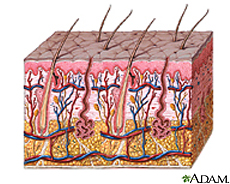 |
 |
 |
Other Health Topics:

-
Related Topics
-
Go Local
- Services and providers for Psoriasis in the U.S.
-
National Institutes of Health
- The primary NIH organization for research on Psoriasis is the National Institute of Arthritis and Musculoskeletal and Skin Diseases
Psoriasis is a skin disease that causes itchy or sore patches of thick, red skin with silvery scales. You usually get them on your elbows, knees, scalp, back, face, palms and feet, but they can show up on other parts of your body. A problem with your immune system causes psoriasis. In a process called cell turnover, skin cells that grow deep in your skin rise to the surface. Normally, this takes a month. In psoriasis, it happens in just days because your cells rise too fast.
Psoriasis can last a long time, even a lifetime. Symptoms come and go. Things that make them worse include
- Infections
- Stress
- Dry skin
- Certain medicines
Psoriasis usually occurs in adults. It sometimes runs in families. Treatments include creams, medications and light therapy.
National Institute of Arthritis and Musculoskeletal and Skin Diseases
-
Psoriasis(American Academy of Family Physicians)
Also available in Spanish
-
Psoriasis
 (Patient Education Institute) - Requires Flash Player
(Patient Education Institute) - Requires Flash Player
Also available in Spanish
-
What Is Psoriasis?

 (National Institute of Arthritis and Musculoskeletal and Skin Diseases)
(National Institute of Arthritis and Musculoskeletal and Skin Diseases)
| Basics | Learn More | Multimedia & Cool Tools |
|---|---|---|
| Research | Reference Shelf | For You |
-
Overviews
- Psoriasis(Mayo Foundation for Medical Education and Research)
- Psoriasis: More Than Cosmetic(Food and Drug Administration)
-
Questions and Answers about Psoriasis
 (National Institute of Arthritis and Musculoskeletal and Skin Diseases)
(National Institute of Arthritis and Musculoskeletal and Skin Diseases)
-
Latest News
-
 FDA Requires Stronger Fungal Infection Warning for TNF Blockers(09/15/2008, Food and Drug Administration)
FDA Requires Stronger Fungal Infection Warning for TNF Blockers(09/15/2008, Food and Drug Administration)
- After Fits and Starts, New Hope for Psoriasis Patients(08/25/2008, HealthDay)
-
-
Diagnosis/Symptoms
- About Psoriatic Arthritis: The Diagnosis(National Psoriasis Foundation)
-
Treatment
- Psoriasis Treatment(National Psoriasis Foundation)
- Psoriatic Arthritis Treatments(National Psoriasis Foundation)
-
Nutrition
- Your Diet and Psoriasis(National Psoriasis Foundation)
-
Coping
- Psychological Aspects of Psoriasis(American Academy of Dermatology)
- Social Factors(National Psoriasis Foundation)
-
Disease Management
- Are Lifestyle Choices Affecting Your Psoriasis?(American Academy of Dermatology)
- How to Make Psoriasis Control More Effective This Summer(American Academy of Dermatology)
- Minimizing Flare-Ups(American Academy of Dermatology)
-
Specific Conditions
- About Psoriasis: The Forms and Specific Skin Sites of Psoriasis(National Psoriasis Foundation)
- Psoriatic Arthritis(National Psoriasis Foundation)
- Psoriatic Nails(American Academy of Dermatology)
- Understanding Scalp Psoriasis May Head Off Hair Loss(American Academy of Dermatology)
-
Related Issues
- Camouflage & Cover-Ups(National Psoriasis Foundation)
- Frequently Asked Questions about Psoriasis(American Academy of Dermatology)
- Psoriasis Triggers(American Academy of Dermatology)
-
Pictures & Photographs
- Psoriasis(Logical Images)
- What Psoriasis Looks Like(American Academy of Dermatology)
- Tutorials Return to top
-
Anatomy/Physiology
- What Is Known about Psoriasis: Immune System Involvement(National Psoriasis Foundation)
-
Clinical Trials
-
ClinicalTrials.gov: Psoriasis
 (National Institutes of Health)
(National Institutes of Health)
-
ClinicalTrials.gov: Psoriasis
-
Genetics
- Role of Genetics in Psoriasis(National Psoriasis Foundation)
-
Research
- Psoriasis Increases Risk of Heart Attack(American Academy of Dermatology)
-
Researchers Identify Gene Which Causes Susceptibility to Psoriasis
 (National Institute of Arthritis and Musculoskeletal and Skin Diseases)
(National Institute of Arthritis and Musculoskeletal and Skin Diseases)
-
Journal Articles
References and abstracts from MEDLINE/PubMed (National Library of Medicine)
- Article: Clobetasol propionate emollient formulation foam in the treatment of corticosteroid-responsive...
- Article: Psoriasis and the metabolic syndrome.
- Article: The effect of HESA-A on psoriasis vulgaris.
- Psoriasis -- see more articles
-
Dictionaries/Glossaries
- Glossary(American Academy of Dermatology)
-
Directories
- Find a Dermatologist(American Academy of Dermatology)
- National Psoriasis Foundation: Physician Directory(National Psoriasis Foundation)
-
Organizations
- American Academy of Dermatology
-
National Institute of Arthritis and Musculoskeletal and Skin Diseases

Also available in Spanish
- National Psoriasis Foundation
-
Statistics
- About Psoriasis: Statistics(National Psoriasis Foundation)
-
Children
- Emotional Effects of Psoriasis on Children(National Psoriasis Foundation)
- Genital Psoriasis in Children(National Psoriasis Foundation)
- Juvenile Psoriatic Arthritis(Arthritis Foundation)
- Psoriasis Information for Kids(National Psoriasis Foundation)
-
Teenagers
- Psoriasis Information for Teens(National Psoriasis Foundation)
- Women Return to top
| Home | Health Topics | Drugs & Supplements | Encyclopedia | Dictionary | News | Directories | Other Resources | |
| Disclaimers | Copyright | Privacy | Accessibility | Quality Guidelines U.S. National Library of Medicine, 8600 Rockville Pike, Bethesda, MD 20894 National Institutes of Health | Department of Health & Human Services |
Date last updated: 17 September 2008 Topic last reviewed: 29 May 2008 |






